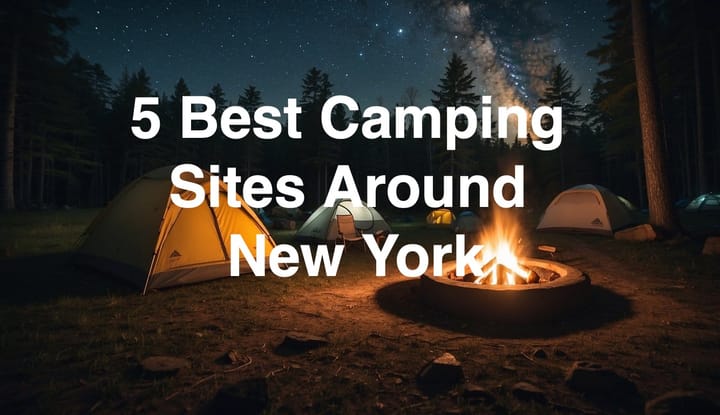Camping Ethics
Engaging in outdoor activities, especially camping, is not just about the joy of the outdoors; it's also about preserving the natural environment and ensuring that others can enjoy it in the future.

Ethical camping practices are essential to maintain the natural beauty and integrity of the wilderness.
Familiarizing yourself with the Leave No Trace principles is a great starting point. These guidelines help minimize your impact on the environment, and they have become the standard for responsible outdoor behavior.
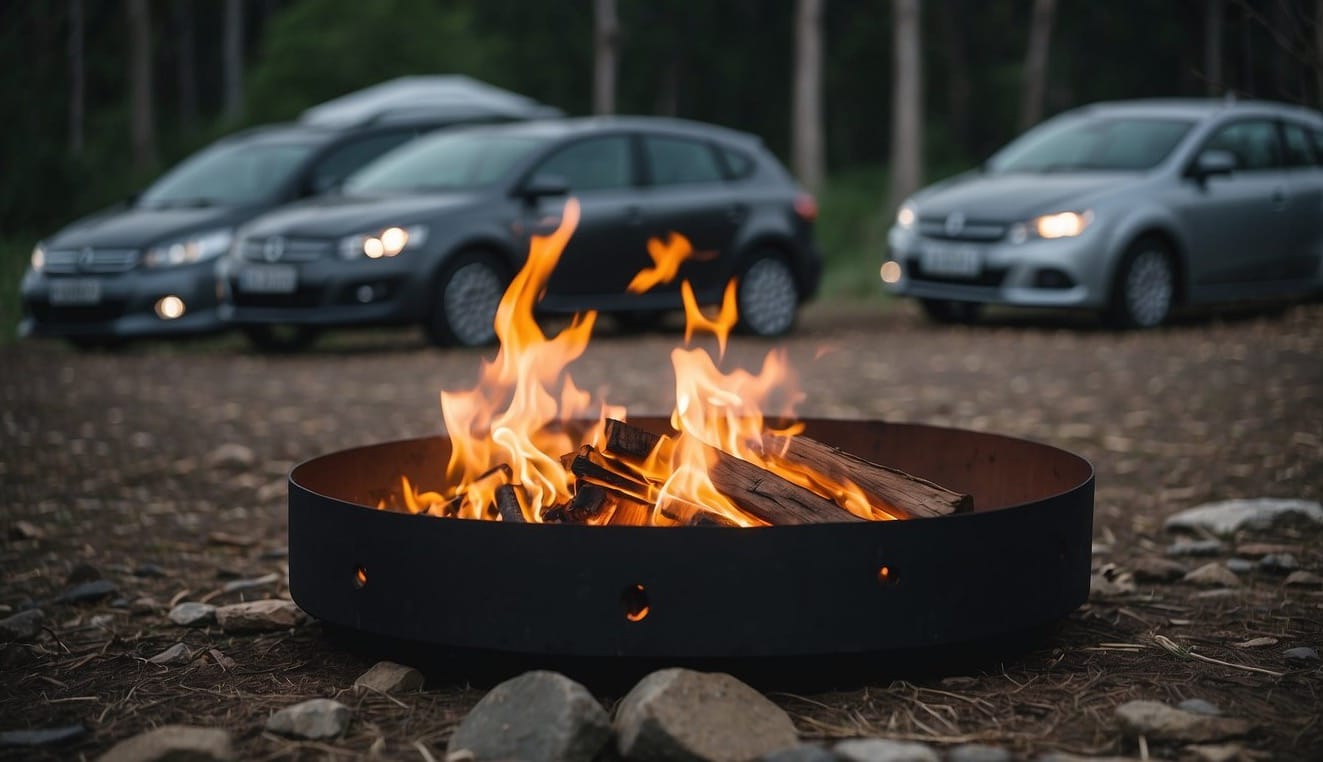
As you plan your trip, it's important to prepare with both the environment and other visitors in mind. This means selecting campsites that will reduce your impact, managing waste properly, and being considerate of wildlife and fellow campers.
By following ethical camping practices, not only do you enhance your own experience, but you also contribute to the outdoor community and the preservation of natural spaces.
Remember, the great outdoors is a shared resource, and our collective actions can have a lasting impact.
Key Takeaways
- Practicing ethical camping ensures preservation of natural spaces for future generations.
- Preparation and planning are vital to minimize your environmental impact.
- Leave No Trace principles guide respectful interaction with the environment and fellow campers.
Ethical Planning Before The Trip
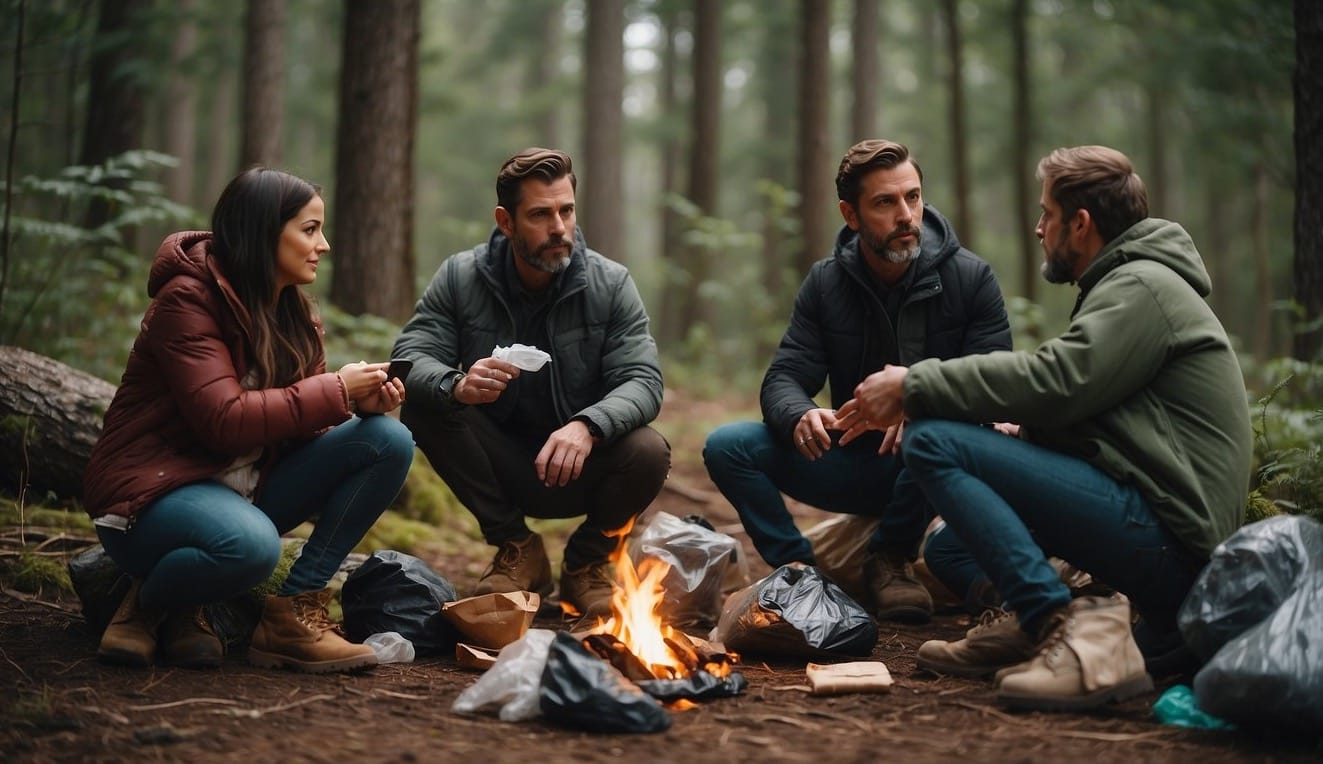
Proper preparation is crucial to ensure that your camping experience is both enjoyable and aligned with environmental stewardship.
Your actions before setting foot on the trail can significantly influence the impact of your outdoor adventure.
Understanding and Researching the Outdoors
Research is a fundamental part of planning your camping trip.
You should educate yourself on the area's flora and fauna, as well as any rules or regulations set forth by the managing body.
This knowledge helps you to minimize your impact on the environment and ensures that you are respecting the natureyou're immersing yourself in.
- Research the specific site to find any sensitive habitats or protected species.
- Understand the regulations regarding campfires, waste disposal, and wildlife interactions.
Preparation and Packaging Essentials
A cornerstone of ethical camping is the principle to plan ahead and prepare.
Thoughtful packing helps you carry only what you need, reducing waste and potential litter.
Consider packaging items in reusable containers, and plan meals to avoid excess food waste.
- Make a checklist for essential items to ensure nothing is forgotten.
- Pack your items in reusable containers to minimize waste.
Weather Considerations and Safety
Being prepared for changes in weather is a key safety measure and part of responsible trip planning.
Check the weather forecast in advance and understand how it affects potential hazards.
- Carry weather-appropriate gear to maintain comfort and safety.
- Educate your group on what to do in case of weather-related emergencies.
Selecting a Campsite
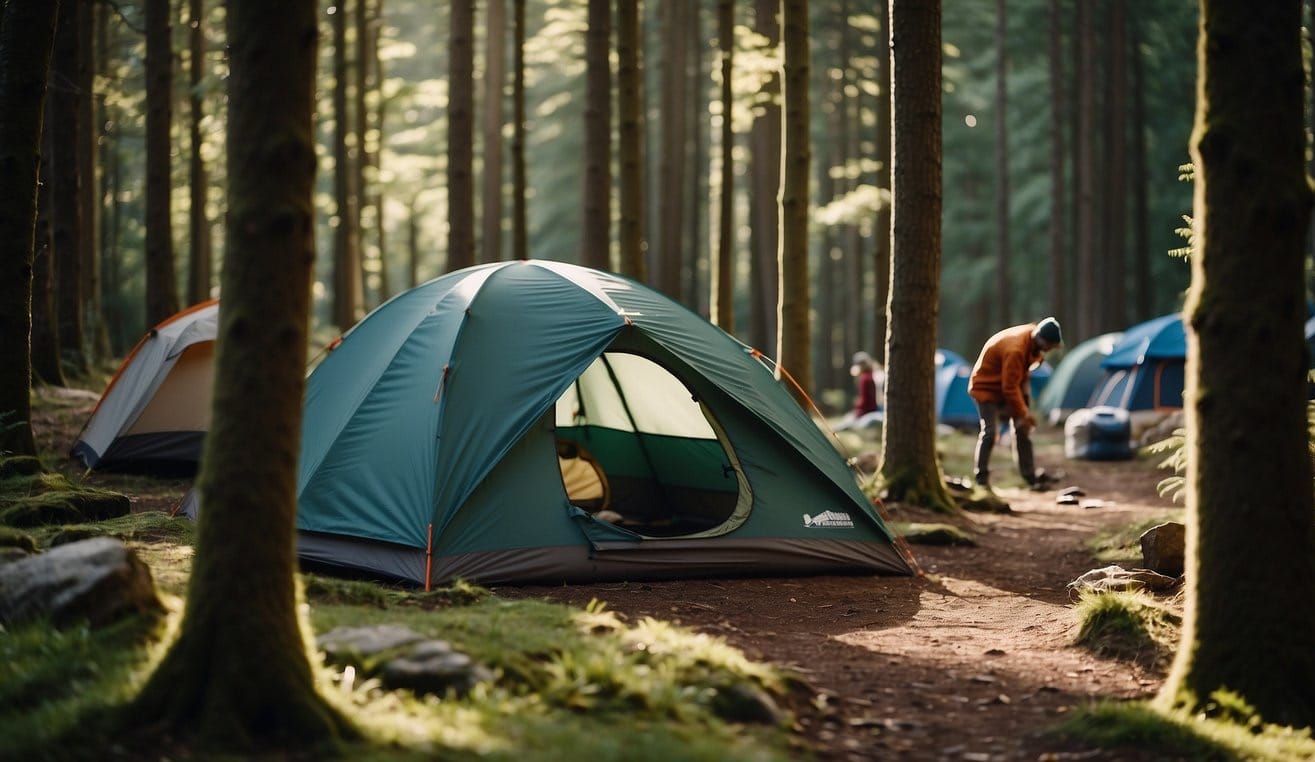
When you venture into the wilderness, the practice of setting up camp has a significant impact on the land.
Choosing a site and establishing your temporary home in nature requires careful consideration to preserve the ecosystems you're enjoying.
Camping on Durable Surfaces
Durable surfaces include established campsites, rock, sand, gravel, dry grasses, or snow.
These areas are resilient to the wear and tear of multiple campers.
While in the backcountry, aim to camp on surfaces that will not be damaged by your tent and foot traffic.
Avoid places where impacts are just beginning, such as burgeoning vegetation or mosses, as your presence could inhibit growth and cause unnecessary damage.
Respecting Established Campsites
Use established campsites when possible.
These sites are designed to minimize the environmental footprint of a campsite on the surrounding land.
They often include existing trails, fire rings, and clear areas for tents which allow you to avoid trampling new vegetation or creating new impact areas.
In the backcountry, when established sites are not available, keep campsites small to minimize the disturbance.
Ensure you're at least 200 feet away from water sources to protect both the local water quality and vegetation, and to maintain the natural behavior of wildlife.
Stick to existing trails whenever possible to prevent soil erosion and protect the root systems of trees.
When you leave your campsite, it should look as though you were never there, which includes dismantling any structures, such as fire rings, you may have created in areas without established campsites.
Outdoors Waste Management
Managing waste effectively is a critical part of outdoor ethics. You must dispose of waste properly to minimize your impact on the environment and ensure the natural area remains pristine for other visitors.

Appropriate Disposal of Human Waste
When nature calls in the wild, it's vital to handle human waste responsibly.
Catholes are the most common method for disposing of feces. To create a cathole:
- Locate a site at least 200 feet (about 70 paces) from water, trails, and camp areas.
- Use a small shovel to dig a hole 6-8 inches deep and 4-6 inches in diameter.
- Once used, cover and disguise the cathole with natural materials.
For toilet paper and hygiene products, these should never be buried as they can take longer to decompose.
Instead, place them in a plastic bag and pack them out with your trash.
In areas where catholes are not allowed, you'll need to use portable toilet systems and waste disposal bags.
Handling Trash and Leftovers
Your approach to dealing with trash is crucial in preserving outdoor spaces.
- Pack It In, Pack It Out: Carry out all trash, garbage, and leftover food.
- This includes organic waste such as fruit peels or nut shells, as they are not native to the area and can take a long time to decompose.
- Garbage: Collect all your garbage in a durable, reusable container or bag.
- This containment strategy reduces the likelihood of animals getting into it, which can be harmful to them and cause pollution in the natural habitat.
- Biodegradable Soap: If you need to wash dishes or your body, always use biodegradable soap sparingly and rinse well away from any water sources to avoid contamination.
- Micro-trash: Be vigilant about picking up smaller pieces of trash such as wrappers, bits of plastic, and cigarette butts.
Minimizing Campfire Impacts

Campfires are a beloved tradition but can leave a lasting impact on the natural environment. Your actions can help mitigate these effects by choosing materials wisely and adhering to safe fire practices.
Choosing Firewood and Building Fires
When selecting firewood, opt for sticks and branches that are on the ground and can be broken by hand.
Avoid breaking branches from trees, as this can damage local flora.
Always prioritize using a lightweight stove for cooking to reduce campfire impacts.
When building fires, keep them small to limit their impact and make it easier to extinguish them completely.
- Use: Sticks that can be broken by hand
- Avoid: Damaging living trees
- Prefer: Lightweight stoves for cooking
Fire Rings and Campfire Safety
Use existing fire rings or fire pans when available, as they are designed to contain your fire and minimize its impact on the surrounding area.
If you must build a new fire, do so in a safe area clear of overhanging branches, and ensure the ground is mineral soil to prevent root fires.
Always be prepared to extinguish your fire, keeping water or dirt nearby for this purpose.
Interacting with Wildlife
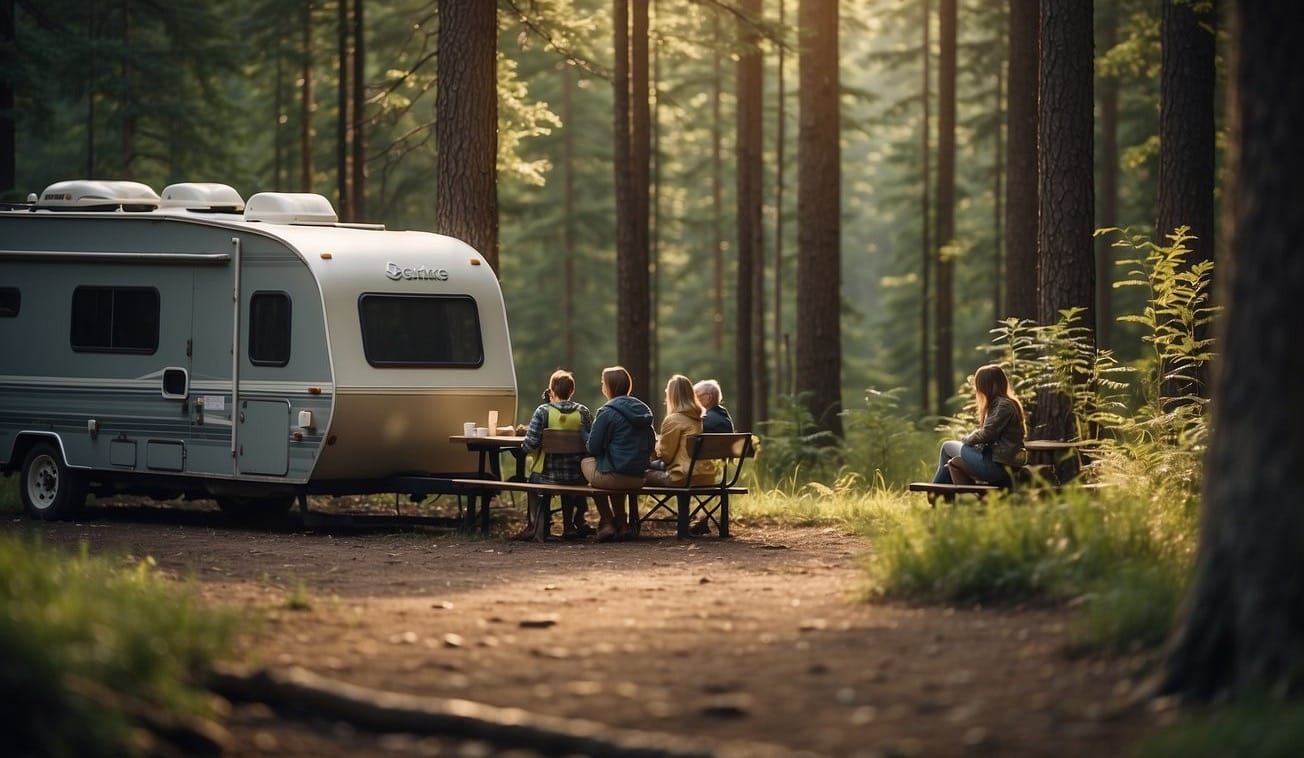
When camping, your encounters with wildlife should be respectful and non-intrusive to protect both the animals and the environment.
Your actions directly impact the wellbeing of the wildlife and the preservation of natural resources.
Wildlife Observation Guidelines
- Observe at a Distance: Always keep a safe and respectful distance from animals. Use binoculars or a zoom lens to view wildlife without getting too close.
- Do Not Disturb: Avoid noisy behavior that can stress animals. If you notice changes in an animal's behavior while you're watching, you're too close.
Wildlife Respect Checklist:
| Action | Benefit |
|---|---|
| Watching quietly | Avoids stressing wildlife |
| Keeping distance | Prevents habituation and preserves animal well-being |
| Staying on trails | Protects vegetation and habitats |
Avoiding Wildlife Feeding and Disturbance
- Feeding Wildlife: Feeding animals disrupts their natural foraging habits and can lead to dependency on human food.
- Secure Your Food: Use bear-proof containers or suspend food away from your campsite to ensure animals cannot access your supplies.
Impact of Feeding Wildlife:
- Alters animal behavior, making them aggressive or too comfortable around humans.
- Can be harmful to their health as human food may not be suitable for their digestive systems.
Protecting Natural Resources:
- Vegetation and Rocks: Leave plants, rock formations, and wildflowers as you find them. Do not pick or move them.
- Water Sources: Avoid contaminating streams and lakes. Do not wash dishes or bathe directly in these water sources.
Consideration for Other Visitors
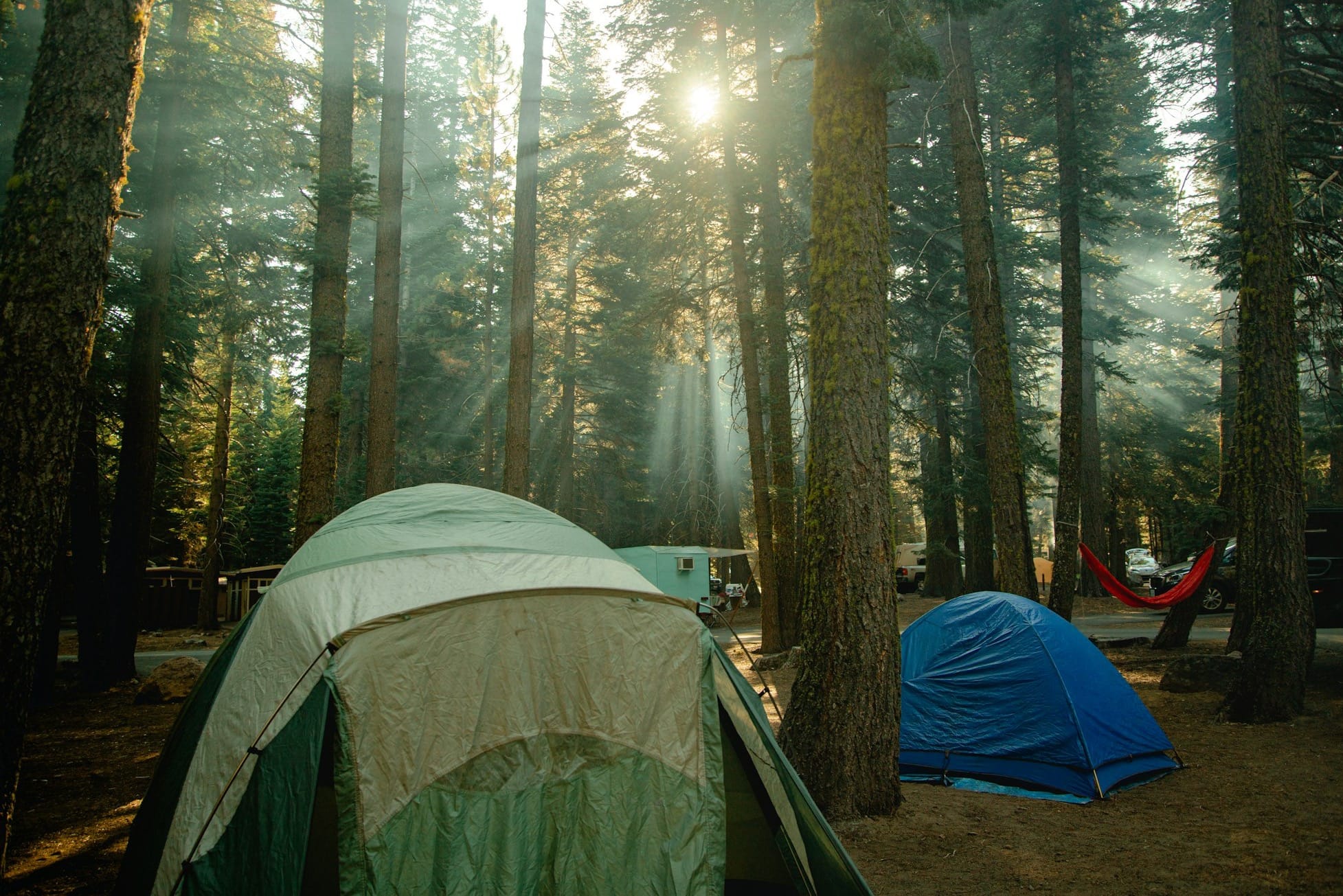
In camping, your awareness and behavior can significantly affect the enjoyment of those around you.
This section will emphasize the importance of managing noise levels and practicing proper camping etiquette in shared spaces to ensure a respectful and pleasant outdoor experience for everyone.
Managing Noise Levels
- Understand Quiet Hours: Most campgrounds enforce quiet hours, usually from 10 p.m. to 6 a.m. Honor these times by keeping your noise to a minimum.
- Be Audio-Aware: Even outside of quiet hours, be mindful of your volume.
- Your group should avoid excessive noise, such as loud conversations or music that could disrupt fellow campers or the local wildlife.
- Consider Your Activities: Choose activities that foster tranquility in the outdoors.
- When hiking on trails, for example, keep your noise levels respectful to preserve the peace for other hikers and wildlife.
Camping Etiquette and Shared Spaces
- Respect the Campsite: Your campsite is your temporary home, and the campsites adjacent to yours are the same for other visitors. Keep your space clean and your belongings contained within your allocated area.
- Yield on Trails: When you’re on hiking trails, show respect by yielding appropriately.
- This might mean stepping to the side to let a faster group pass or giving right-of-way to those going uphill.
- Shared Facilities: Many campgrounds have shared facilities like washrooms and picnic areas. Use these spaces considerately, leaving them clean and available for the next camper.
Environmental Education and Advocacy
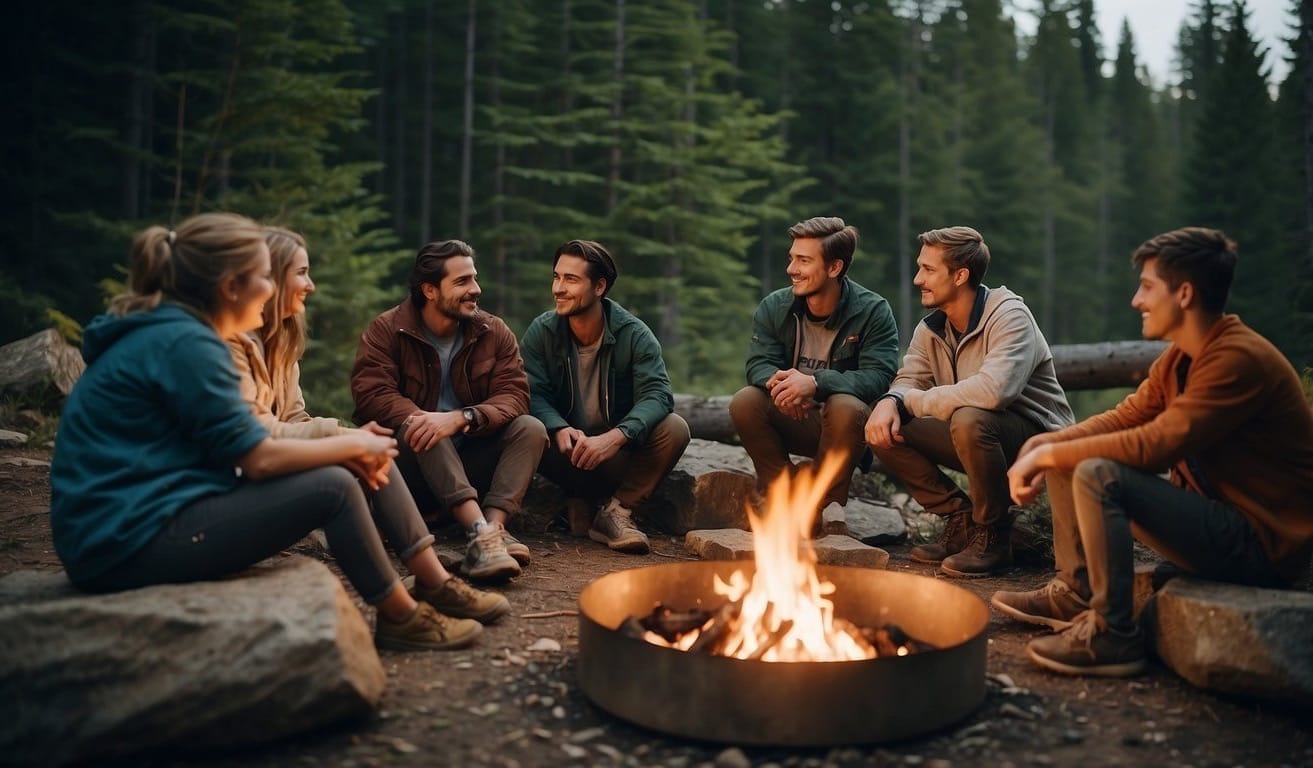
When outdoors, your actions can promote sustainability and respect for nature. Understanding and applying environmental education and advocacy ensures that you are not just a visitor but a steward of the natural world.
Promoting Conservation Principles
To preserve the integrity of pristine areas such as national parks, it’s crucial to embody conservation principles. The Leave No Trace (LNT) seven principles are guidelines designed to minimize your impact:
- Plan Ahead and Prepare: Know the regulations and special concerns for the area you’ll visit.
- Travel and Camp on Durable Surfaces: Stay on trails and camp at least 200 feet from lakes and streams.
- Dispose of Waste Properly: Pack it in, pack it out.
- Leave What You Find: Preserve the past; examine, but do not touch, cultural or historic structures and artifacts.
- Minimize Campfire Impacts: Use a lightweight stove for cooking and enjoy a candle lantern for light.
- Respect Wildlife: Observe wildlife from a distance. Do not follow or approach them.
- Be Considerate of Other Visitors: Respect other visitors and protect the quality of their experience.
These principles serve as the foundation of ethical behavior in natural areas and are critical for maintaining ecosystem health and preventing the spread of diseases.
Sharing Knowledge and Outdoor Ethics
Education is a powerful tool for ensuring the longevity of natural spaces. By sharing knowledge of outdoor ethics, you empower yourself and others to make informed decisions in the wild. Here’s how you can contribute:
- Inform Your Group: Before embarking on your trip, ensure everyone is aware of the rules and regulations of the destination to protect the environment.
- Model Good Behavior: Demonstrate the LNT principles by your own actions.
- Volunteer: Participate in local efforts to clean trails or restore habitats.
- Respect Varied Interests: Understand that people enjoy the outdoors in different ways and be open to other perspectives as long as they align with conservation ethics.
When you share your knowledge, you help create a community vested in the well-being of our shared natural resources.
Post-Trip Actions and Reflection
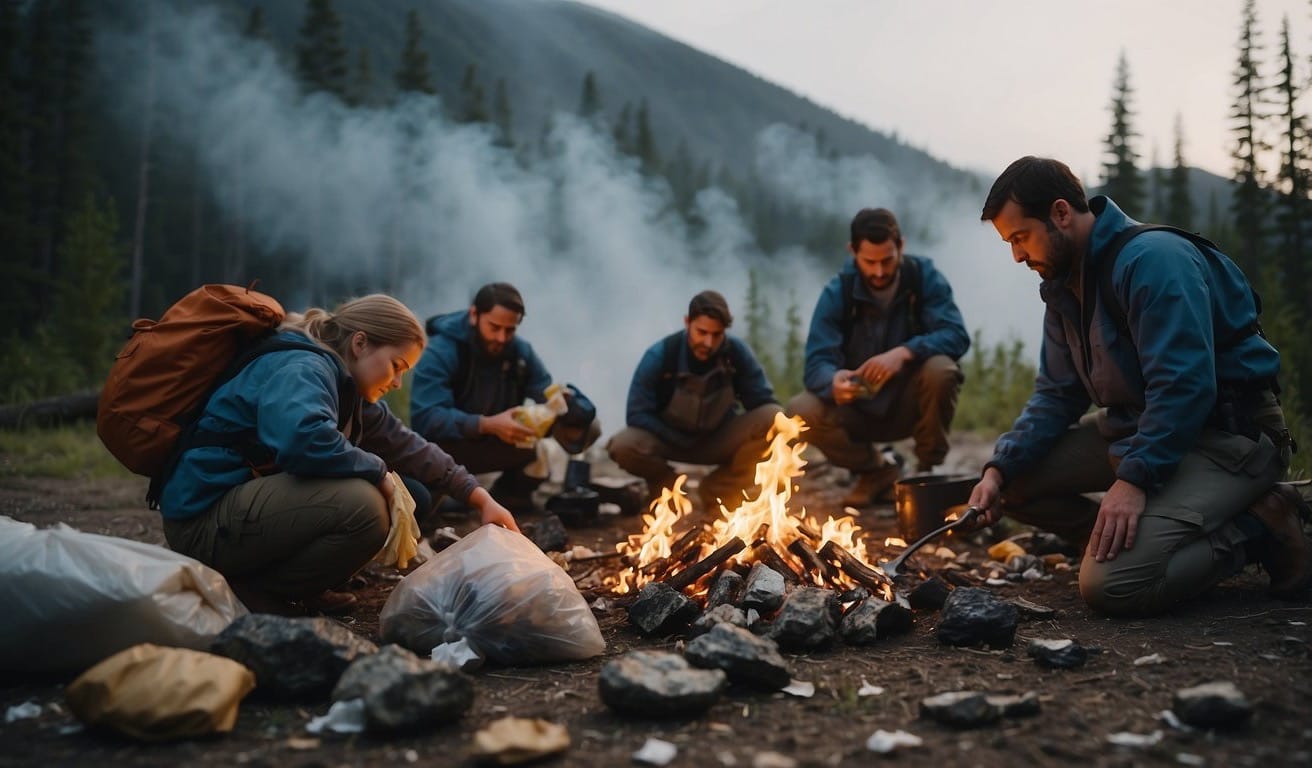
After your adventure, taking time to reflect on your impact and the ways you can improve for future trips is key to practicing responsible camping ethics.
Review and Minimize Future Impacts
When you return from your trip, it is important to assess the consequences of your visit on the natural environment.
Consider how you interacted with wildlife, plants, and ecosystems. Did you follow Leave No Trace principles?
Reflect on whether your food was stored properly to avoid attracting wildlife. List what worked well and identify areas that need improvement. For example:
- Food Storage:
- Succeeded in storing food in bear-proof containers?
- Found traces of wildlife near your camp due to improper storage?
Use this analysis to create a personalized set of guidelines that will help minimize your impacts on subsequent outings.
Community Involvement and Continued Learning
Your camping trip doesn’t end when you pack up; consider joining or participating in local educational programs or online forums to share experiences and learn from others.
Engage in community efforts aimed at conservation and responsible recreation. By involving yourself in these initiatives, you support efforts to preserve the natural world for future campers and hikers. Important post-trip steps include:
- Regulations: Stay informed about the regulations that govern the places you visit.
- Education: Become an advocate for the environment by educating others about responsible practices.
- Ecosystems: Research the ecosystems you visited to better understand how your presence affects them.
Your active participation in the camping community furthers both your understanding and appreciation of the natural world, leading to more ethical and mindful camping experiences.
Frequently Asked Questions
The following FAQs delve into the essentials of camping ethics, focusing on how you can preserve the natural environment while enjoying your outdoor activities responsibly.
What are the core principles of Leave No Trace when camping?
The Leave No Trace principles for camping are: plan ahead and prepare; travel and camp on durable surfaces; dispose of waste properly; leave what you find; minimize campfire impacts; respect wildlife; and be considerate of other visitors. These guidelines are designed to reduce the impact on the environment.
How can campers plan ahead and prepare for minimal environmental impact?
You can minimize your environmental impact by researching the area you plan to visit, understanding regulations and special concerns, preparing for extreme weather, hazards, and emergencies, and re-packaging food to minimize waste.
Why is it important to travel and camp on durable surfaces?
Traveling and camping on durable surfaces reduces the likelihood of damaging vegetation or causing soil erosion. In popular areas, concentrate use on existing trails and campsites, and in pristine areas, disperse use to prevent the creation of new impacts.
Can you explain the etiquette for sharing the wilderness with others?
Sharing the wilderness with others means keeping noise levels down, respecting the solitude of others, maintaining appropriate distances from other campers, and being courteous on shared trails by yielding to other hikers and campers as needed.
What practices define good outdoor ethics for hikers and campers?
Good outdoor ethics for hikers and campers include sticking to marked trails, keeping campsites clean, managing waste properly, respecting wildlife and flora, and following posted signs and guidance. The aim is to leave no trace of your visit so that the outdoors remains pristine for others.
How can Leave No Trace principles be applied to maintain the natural integrity of outdoor spaces?
Leave No Trace principles can be upheld by carrying out all your trash. You should also minimize campfire impacts through the use of a camp stove or established fire rings. In addition, camping on resilient surfaces and observing wildlife from a distance without feeding them or altering their natural behavior.
